Down and out: How 5 months of genocidal war on Gaza paralyzed Israeli economy
By Syed Zafar Mehdi
Last month, in what economic pundits saw as a death knell for the already-beleaguered Israeli economy, a US credit rating agency downgraded the regime’s rating and outlook.
The downgrade from “stable” to “negative”, according to Moody’s, is the direct consequence of the Israeli regime’s genocidal war on the Gaza Strip and political instability inside the occupied territories marked by growing discontent and simmering protests.
A few weeks ago, the Israeli regime’s Central Bureau of Statistics released another damning report, according to which Tel Aviv’s economy shrank by nearly one-fifth in the last quarter of 2023.
Amid depleting consumer spending, trade and investment since October 7, Israel’s Gross Domestic Product (GDP) recorded a 19.4 percent drop in its annual rate in the last three months of 2023.
Benjamin Netanyahu's regime launched a devastating war on the coastal Palestinian territory on October 7, stung by the unprecedented Al-Aqsa Storm Operation led by Hamas.
In the last 156 days, more than 31,000 Palestinians, including over 14,000 children and nearly 9,000 women have been killed in Gaza. It has also spawned the worst humanitarian crisis in the territory.
According to observers, the indiscriminate bombings on Gaza have badly backfired on the regime amid both internal and external turmoil for the Netanyahu regime.
Hundreds of thousands of Israeli reservists have in recent months been forced to abandon their jobs while many more have fled in panic, due to which major industries have come to a grinding halt.
The labor shortage is acute as over 350,000 reservists have been pressed into military service, as per the Organization for Economic Cooperation and Development, which says the law has caused a “pronounced slowdown” of the Israeli economy, which had grown about 3 percent before October 7.
Foreign investments have also virtually ended as investors are not willing to put their money on tinderbox – both due to the war in Gaza as well as the internal turmoil for the Netanyahu regime.
According to the data from the Israeli labor ministry in December, about 950,000 jobs were lost in the first three months of the war, which has increased manifolds now as the situation remains precarious and the war rages on - now into its sixth month.
Multi-national brands linked to the Israeli regime have also faced blanket boycotts in recent months, suffering enormous losses. Many companies have tried to distance themselves from the regime.
The impact of war on the Israeli economyhttps://t.co/IhAIrnHx55https://t.co/IhAIrnHx55
— Press TV 🔻 (@PressTV) November 17, 2023
Domestic economy in tatters
Every sector of the Israeli economy – from high-tech to agriculture to tourism to various industries – has been irreparably dented by the raging war on Gaza, a problem exacerbated by the shortage of workforce and precarious situation.
Many businesses have suspended their operations while others have been forced to shut down their operations. Some workers have been forced to join military duty while many others have fled.
A Bloomberg survey last month said the Israeli economy suffered one of its worst-ever slumps after it launched the genocidal war on Palestinians in Gaza, with businesses coming to a screeching halt.
The regime’s GDP plummeted by 19.4 percent in the last quarter of 2023, which the report said was worse than every estimate in its survey of analysts.
“The release highlights the degree to which the Israeli economy has been affected by the conflict, particularly on the private activity side,” Goldman Sachs economists Tadas Gedminas and Kevin Daly were quoted as saying in the report.
Israeli newspaper Maariv, in a report earlier this week, also said the continuation of the Israeli war on Gaza has contributed to massive losses for the regime in both political and economic spheres.
It followed another report published by the Israeli website Walla, which cited the Director of the Israeli Tax Authority Shai Aharonovitz as saying that the damage caused by the Gaza war is “six times greater” than the Second Lebanon War (2006), and about half a million compensation claims have been filed by those who have suffered due to it.
According to analysts, the Israeli war on Gaza, which has failed in all its stated objectives, has resulted in a steep drop in the regime’s tax revenues, skyrocketing debt and economic recession.
The regime's GDP has also taken a serious blow, as attested by Moody’s report in February, which cut the regime’s rating to ‘A2’ and described its credit outlook as ‘negative’.
It was the first time ever that the regime’s economic outlook was downgraded, pointing to the staggering costs of the war that is increasingly turning out to be an exercise in futility.
The war, according to analysts, has discouraged potential investors and disrupted the labor market, especially with hundreds of thousands of workers summoned for mandatory military duty.
In a report in November, the Bank of Israel said the absence of thousands of workers from their jobs was costing the Israeli economy an estimated $600 million a week, or about 6 percent of the weekly GDP.
That number, according to economic analysts, has surged dramatically in the past three months, to the tune of a few billion dollars every week.
The regime’s tourism industry has also been affected. Monthly figures announced by Israel’s Central Bureau of Statistics revealed that in January only 500 single-day visits to the occupied territories were registered, compared to 14,000 in January 2023, marking a drastic decrease of 96 percent.
The travel industry used to make up nearly 3 percent of the regime’s GDP in 2019, before the pandemic. The figure fell to 1.1 percent in 2021 and has been virtually paralyzed since October 7.
The Israeli newspaper Calcalist reported in January that about 900,000 tourists were expected to visit the occupied territories in the three months after the start of the war. The number dropped to 190,000 because many of them opted out. That number has also sharply come down now.
Israeli economy plunges almost 20% as Gaza war takes heavy tollhttps://t.co/lZdwpNwVzy
— Press TV 🔻 (@PressTV) February 21, 2024
“The war (on Gaza) was a huge breaking point for the (Israeli) economy which is still ongoing,” Professor Benjamin Bental from the Taub Center for Social Policy Studies was quoted as saying in December by The Median Line website.
“There are tremendous consequences that we still cannot estimate the end of.”
A RAND analysis in 2015 estimated that the financial impact of any conflict between the Israeli regime and Palestine in the next ten years would be to the tune of $400 billion.
Daniel Ege, the director of the Economics and National Security Initiative at the RAND Corporation, who authored that report, in an article published in November made a fresh assessment.
“For Israel, 90 percent of the economic shock will come from the indirect effects: reduced investment, a disrupted labor market, and slowed productivity growth. The specifics of this current crisis will, of course, differ from our model and the past,” he wrote.
Israeli ports hit the hardest
In the past five months, gas fields in the occupied territories have dried, airlines have become defunct, farms have been destroyed, major businesses have shut down and ports have been empty.
Colossal losses have been recorded at ports occupied by the Israeli regime, most notably the Port of Umm Al-Rashrash (Eilat), which recorded a 90 percent drop in traffic and $3 billion in direct losses.
“All cargoes arriving in Eilat through the Bab el-Mandeb Strait from the Far East, i.e. China, Japan, South Korea and India, are no longer transported because ships are afraid to pass through the Bab el-Mandeb Strait,” Gideon Golber, CEO of the Eilat port company, said late January.
Golber’s company deals primarily with the import of cars and export of potassium fertilizers, and before October 7, 50,000 new cars were stored at the port. Yemeni military’s actions in support of Gaza have virtually brought business activities at the bustling port to a grinding halt.
“If Yemeni operations in the Red Sea continue, we will reach a situation where there are no ships in the port,” he was quoted as saying by Reuters, referring to the repercussions of the Red Sea events.
Eilat Port has also been struck with missiles by both the Yemeni military and the Iraqi resistance groups, sending ripples of shock and fear among investors and shipowners there.
The two other major Israel-occupied international ports, Haifa and Ashdod, a third of whose transport depends on the Red Sea, have also recorded heavy losses, with a 70 percent drop in transshipment.
Yemeni military has carried out a string of operations against ships linked to the Israeli regime or its Western backers, mainly the US and the UK, in the Red Sea in solidarity with the people of Gaza.
The operations have forced major shipping companies doing trade with the Israeli regime to avoid the strategic waterway in recent months, incurring staggering losses for the regime.
Amid the continuation of the Yemeni military’s operations against ships trading with the Israeli regime in the Red Sea, it is to be expected that the losses will continue to pile up.
The Islamic Resistance in Iraq has also carried out attacks on the Israeli-occupied ports, including Haifa and Ashdod, as well as the natural reserves in the Mediterranean Sea.
Haifa Port (situated on the Mediterranean) is believed to store about 90 percent of essential commodities destined for the occupied Palestinian territories.
The operations of the strategic port were taken over by Indian business conglomerate Adani Group in February, months after a consortium of Adani Ports and Special Economic Zone and Israel’s Gadot Group won the tender to privatize it for a mammoth USD 1.18 billion.
Only days after the Palestinian resistance launched its unprecedented operation against the occupying regime on October 7, Adani shares fell by 4.5 percent, triggering alarm and anxiety among investors.
According to informed sources, the Indian company has suffered staggering losses in the past five months and speculation has been rife about ending the contract given the high costs.
Ashdod port, close to Gaza's border with occupied territories, handles about 40 percent of the Israeli regime’s total maritime-bound trade, including imports and exports, according to the Israeli media.
Equipped with the Iron Dome military system, Ashdod port has been severely hit amid the war on Gaza, with most cargo diverted to other Israeli-occupied ports, which have also been deserted lately.
One of the first ships to divert from Hashdod to Haida in October last year was a Taiwanese container ship Evergreen Line, which cited a “persistent unsafe situation” amid the war on Gaza. Since many, virtually all ships have avoided the port, turning it into a desolate and barren island.
According to analysts, the total damage to the Israeli economy varies by estimate and reaches over $100 billion, with a minimum of ten years estimated for full recovery, which looks very unlikely.
Military and arms boycott
The Israeli regime's economy has always been heavily dependent on trade and imports, especially military equipment, which makes the regime’s much-hyped military vulnerable to foreign boycott.
Israel's beleaguered military industry is experiencing serious problems with imports as civil society, lawmakers and courts in many countries want to prevent arms exports to the regime.
The decisions have been partly influenced by the interim ruling issued by the International Court of Justice (ICJ) in The Hague in early February, ordering the Israeli regime to halt its genocide in Gaza.
The UN experts also issued a statement late last month, saying any transfer of weapons or ammunition to Israel that would be used in Gaza would “violate international humanitarian law.”
The impact of the ICJ ruling was clearly visible. A court in the Netherlands ordered the Dutch government on February 12 to halt the export of F-35 jet fighter parts to the Netanyahu regime.
The Hague Court of Appeal found that there was "a clear risk" that the F-35 jets used by the Israeli regime, some components of which are exported by the Netherlands, would enable to commit "serious violations of humanitarian law" against the Palestinians in Gaza.
The judges considered that "Israel does not take sufficient account of the consequences for the Gaza Strip civilian population when conducting its attacks."
Israel’s attacks have caused a disproportionate number of civilian casualties, including thousands of children," the Dutch judges concluded.
Britain, one of the Israeli regime’s biggest arms exporters, which manufactures 15 percent of F-35 parts, has resisted calls from rights groups to end the exports. The High Court in London also greenlighted the arms shipments last week by dismissing a case filed by some human rights groups.
Italy, however, has already announced the end of its arms sales to the Israeli regime.
Italian Foreign Minister Antonio Tajani announced in January that his country had halted all exports of military equipment to Tel Aviv. Spain’s foreign minister also claimed that his country has not sold any arms to Israel since the events of October 7, and added that an arms embargo is in place now.
European Union foreign policy chief Josep Borrell, otherwise a staunch supporter of Israel, has also in recent months raised concerns over arms sales to the Tel Aviv regime, even taking potshots at US President Joe Biden for his administration’s approval of $14 billion worth arms to Israel.
“Well, if you believe that too many people are being killed, maybe you should provide fewer arms in order to prevent so many people being killed,” Borrell told reporters last month.
Itochu, one of Japan's largest trading firms, also announced that it was ending its partnership with Elbit Systems, the Israeli regime’s largest arms manufacturer, due to the genocide in Gaza.
Itochu Chief Financial Officer Tsuyoshi Hachimura cited the top UN court’s order on January 26 as the reason for terminating the memorandum of understanding (MoU) signed between Itochu, Elbit and Nippon Aircraft Supply in March last year.
Elbit is the largest military contractor owned by the Tel Aviv regime with a share of 85% in the production of ground equipment and drones, and Japan is one of the world's largest arms importers.
The company has already gained notoriety for testing new weapons on Palestinian civilians, as well as for cases of bribery around the world, multiple failures of their systems in tests aboard, etc.
Due to boycott activism, Elbit has lost hundreds of millions of dollars worth of international contracts in recent years, particularly since October 7 of last year. Many of its factories have been either shut down or disrupted by pro-Palestine activists in the US and the UK.
Since the outbreak of the genocidal war on Gaza, a major collaboration deal with Elbit has also been terminated by the Brazilian state of Rio Grande do Sul.
Boycott of big brands
In November of last year, the Press TV website published an investigation on global companies with close ties to the Israeli regime facing boycott amid the regime’s genocidal war on Gaza.
Worldwide campaigns have been launched during this period calling for the boycott of Israeli and international companies and brands directly or indirectly complicit in the Gaza genocide.
The companies that have faced boycott include Siemens, which is complicit in the regime’s settler-colonialism project through its EuroAsia Interconnector; Hewlett Packard, which helps the regime run biometric systems used to monitor and restrict the movement of Palestinians; AXA Divest, one of the largest investors in Israeli regime-run banks; Puma, a footwear giant that sponsors Israeli football.
Food and beverage giants such as McDonalds and Starbucks have also recorded huge losses.
Starbucks, the multinational chain of coffeehouses and roasteries headquartered in Seattle, has seen losses worth billions of dollars due to the global boycott campaign, which gathered momentum after the company took action against workers’ unions over its pro-Palestine stance.
Starbucks’ longtime CEO Howard Schultz is known to be an ardent supporter of the Israeli regime. Schultz has in the past boasted of being an active Zionist and worked closely with Israeli Premier Benjamin Netanyahu and radical Zionist settler groups, for which he even received awards.
Back in December 2013, around $11 billion in losses were reported, and it is estimated that the figure has now surged to $15 billion as the boycott campaign intensifies.
Last week, retail giant AlShaya Group, which owns the rights to operate Starbucks in West Asia, announced staff downsizing, citing “challenging trading conditions over the last six months.”
McDonald’s also has been hit by the boycott campaign. The US-headquartered company last month reported its first quarterly sales miss in nearly four years, sending the company’s shares down about 4 percent.
The company admitted that the losses were the reflection of “the impact of the war” in Gaza, where the Israeli regime has been carrying out relentless bombings since October 7.
“So long as this conflict, this war is going on, we’re not making any plans, we’re not expecting to see any significant improvement in this,” McDonald’s CEO Chris Kempczinski told investors.
“It’s a human tragedy what’s going on, and I think that that does weigh on brands like ours.”
Ian Borden, the company’s chief financial officer, also noted that the war had meaningfully impacted the fast food giant’s bottom line in the region during the last quarter of 2023.
The campaigns against McDonald’s, Starbucks and other multinational brands have significantly expanded in recent months, including in regional countries such as Jordan, Kuwait and Morocco.
Workers at American tech giants Google and Amazon have also stepped up pressure on their companies to snap ties with the Israeli regime, with Google workers also urging an end to Project Nimbus, under which the tech company supplies technology to the Israeli military for surveillance purposes.
The potential for the expansion of the boycott campaign remains high, as proved by recent large-scale protests in countries considered key trade partners of Israel, as well as public opinion in those countries.
Green Party leader slams UK Chief Rabbi for advancing Israel’s agenda
Medical advances and progress in Iran
Rights group warns of Israeli plot to kill abducted Palestinian leader Barghouti
ICC prosecutor condemns US for equating court judges with terrorists, drug traffickers
Afghan, Pakistani forces exchange heavy fire, shattering fragile ceasefire
IRGC-led Sahand-2025 drill positions Iran as key player in Eurasian security architecture
VIDEO | Dublin activists renew push to rename Herzog Park over Israel’s genocide in Gaza
VIDEO | Berlin streets fill as thousands protest proposed military draft


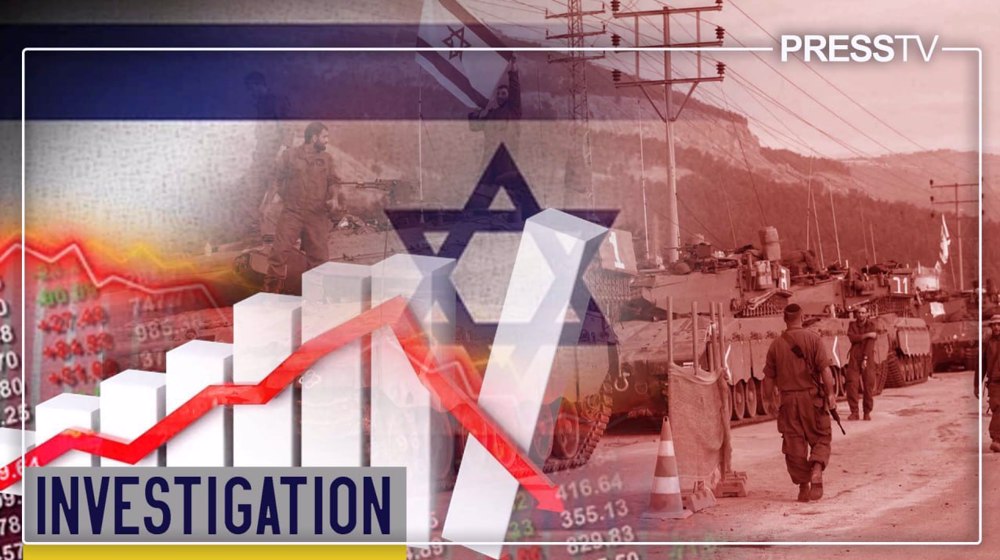

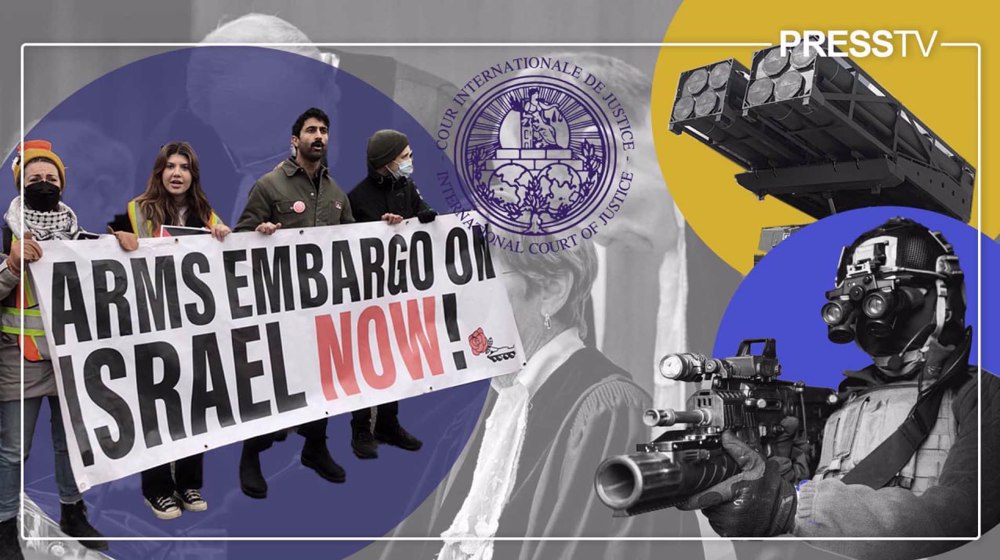
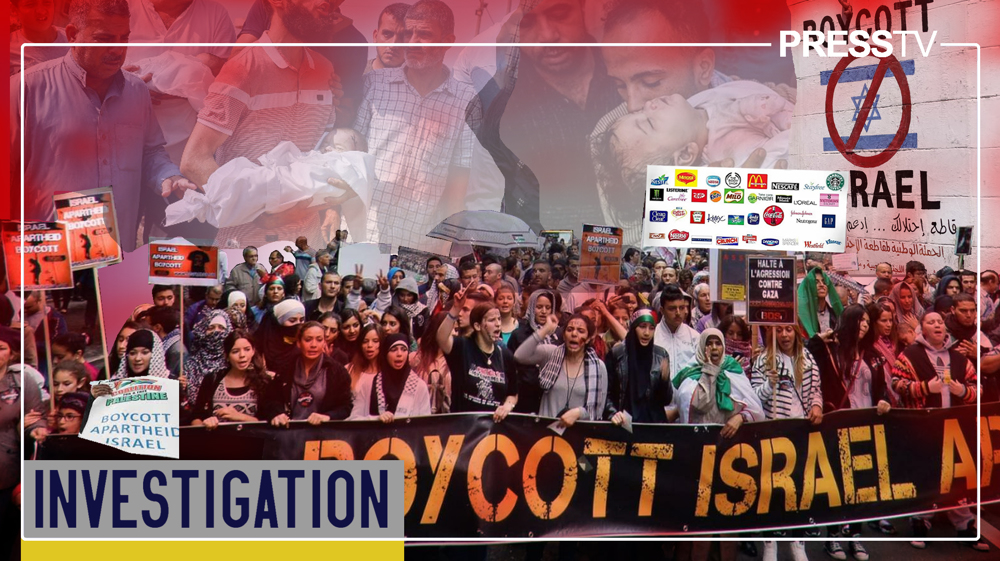






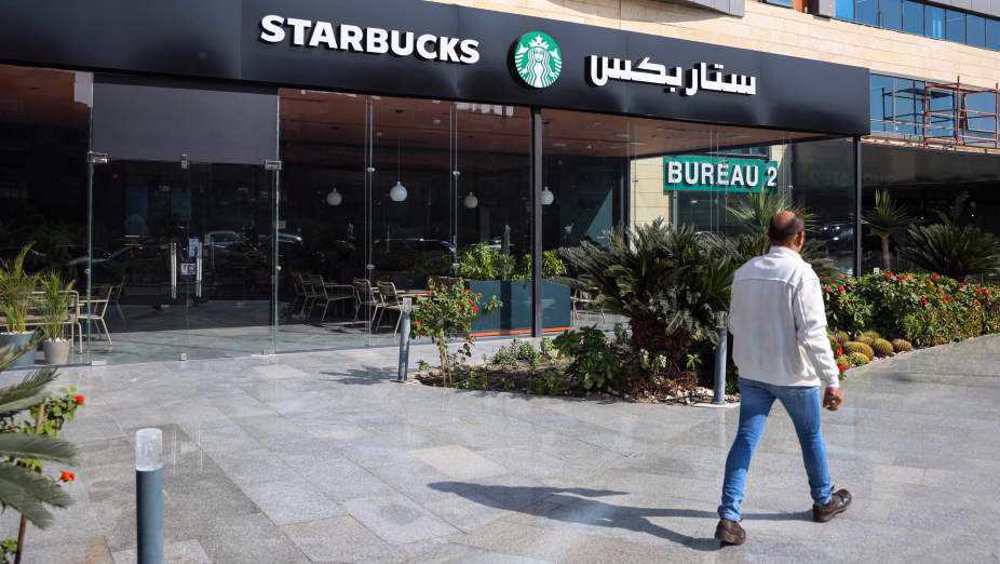

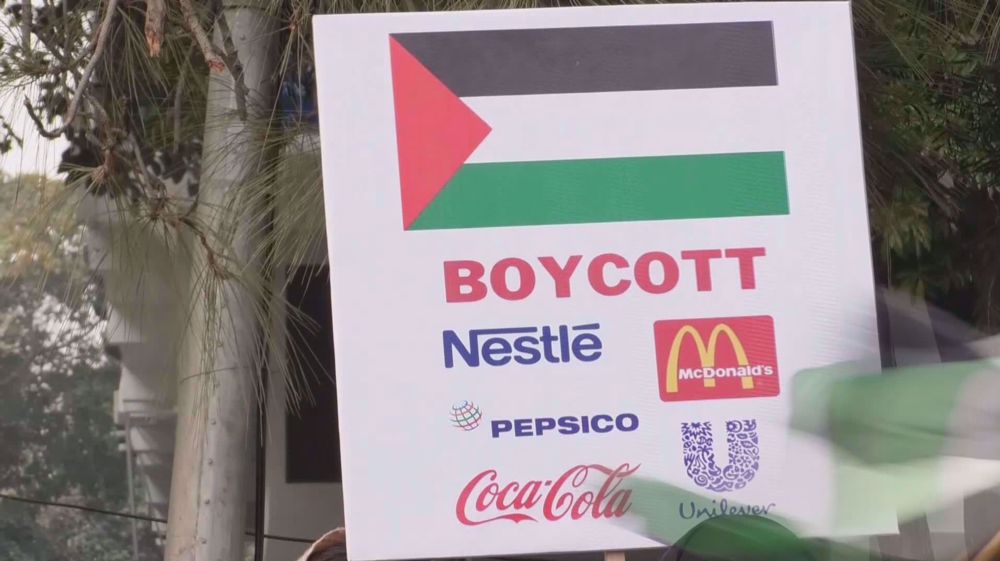
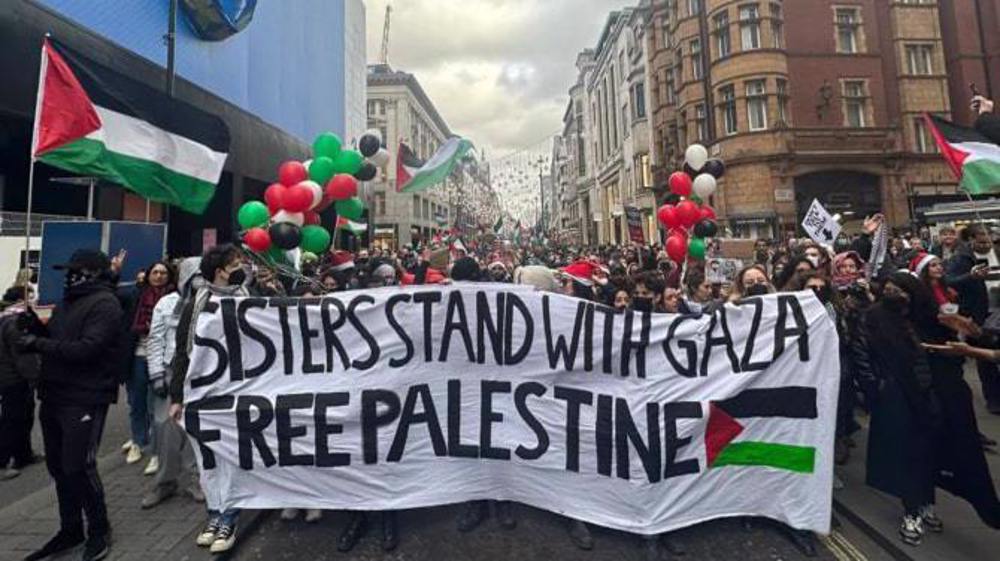


 This makes it easy to access the Press TV website
This makes it easy to access the Press TV website